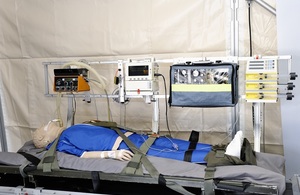Market exploration: forward surgical capability
The Defence and Security Accelerator (DASA) wants to understand the current market capability and development requirements of mobile surgical facilities.

Forward surgical capability
Summary
The Defence and Security Accelerator (DASA) is scoping the potential for follow-on opportunities to develop a mobile forward surgical capability to support military operations in the land domain.
On behalf of the United Kingdom (UK) Ministry of Defence (MOD), we want to better understand the current market capability for the provision of mobile surgical facilities, specifically required to conduct Damage Control Surgery (DCS) to stabilise patients for onward transport to more comprehensive care facilities. This will provide us with knowledge of what potential solutions already exist, novel solutions in development and areas that may require further investment by MOD.
This request for information is not a commitment to subsequently launch a formal DASA competition.
Background
The traumatic injuries sustained during military operations require increasingly complex medical treatment from the point of wounding right the way through to comprehensive surgical and intensive care facilities. One of the first medical interventions critical to a patient’s outcome is DCS. Efficacy of DCS is directly impacted by the time elapsed between trauma to DCS occurring, with the UK Army focussed on DCS within the “golden hour”.
The golden hour is the period of time following a traumatic injury during which there is the highest likelihood that prompt medical and surgical treatment will prevent death.
Due to the nature of the future battlefield, transit times from point of wounding to traditional deployed medical facilities may lead to golden hour targets not being achieved. The UK Army is therefore considering an alternative medical facility laydown including a small, rapidly deployable, mobile surgical capability. The mobile surgical facility could be located closer to potential areas of conflict (front line or forward) and enable DCS nearer to the time of wounding.
The UK Army’s current deployable medical facilities rely on a combination of tented solutions that require significant logistic and engineering support in order to deploy. Deployment of these solutions is likely to be too time-consuming and resource demanding in order to meet the operational demands anticipated in a forward surgical capacity. Additionally, these capabilities are not designed or optimised to the requirement, do not come as self-contained, and do not take advantage of the latest technology opportunities. Therefore, we would like to explore whether the external supply base can support better meeting this mobile surgical capability requirement.
Essential requirements
- minimum capacity to conduct 1x DCS at a time (surgical intervention where the completeness of the immediate surgical repair is sacrificed to achieve haemorrhage and contamination control, in order to avoid a deterioration in the patient’s condition.)
- minimum capacity to handle any combination of 2x pre or post-operative patients
- medical equipment required for 12x DCS in a 48 hour period
- rapidly deployable: ability to fully deploy the capability in under 2 hours once on location
- fully self-sufficient: capable of operating at full capacity for 48 hours without resupply – including power, medical equipment and consumables
- mobile: should be a self-contained mobile solution, or be readily transportable in a palletised/containerised form
- robust: should be “ruggedised”, suitable for transport over challenging terrain and able to operate in temperatures from -20C to 60C
Desirable requirements
- complete solution: fully integrated solution, including transportation, which is fully self-sufficient
- low personnel demands: deployable by 2 or 3 personnel, with low training demand
- modifiable: Army has certain technologies that will need to be integrated into the solution, such as medical equipment and machines, and communication devices
What we want
We are particularly interested in turn-key, fully-integrated solutions which provide mobile surgical capabilities designed for deployment in austere environments, such as those with very limited access to infrastructure, utilities and resupply. We are also interested in solutions with the potential to be developed into fully-integrated solutions.
What we don’t want
We are not interested in solutions that will require sophisticated infrastructure, logistical chain or need a high degree of training in order to deploy.
How to submit a Capability Submission Form
Responses to this market exploration must be submitted via the DASA submission service, for which you will be required to register.
There are 6 questions relating to your capability, where we are seeking to understand what and how much further development is required for a complete solution to all requirements, or whether a combination of separate solutions is required. The information you provide will assist in developing a statement of requirements for potential future activities. You will not be held to deliver to any of the timescales or cost estimates that you may give.
This is not a competition and therefore we are not asking for costed proposals at this stage. However, we have asked for your estimated cost range to inform future activities. This is a market exploration exercise and we do not commit to subsequently launch a formal DASA competition.
Submissions must be submitted by midday on Thursday 3rd September 2020.
Please only provide details of one product/capability per form. If you have a number of potential solutions, then please submit multiple forms. If you have any questions, then please email [email protected] with ‘Forward Surgical Capability’ in the subject line.
How we use your information
Information you provide to us in a Capability Submission, that is not already available to us from other sources, will be handled in-confidence. By submitting a Capability Submission Form you are giving us permission to keep and use the information for our internal purposes, and to provide the information onwards, in-confidence, within UK Government. The Defence and Security Accelerator will not use or disclose the information for any other purpose, without first requesting permission to do so.